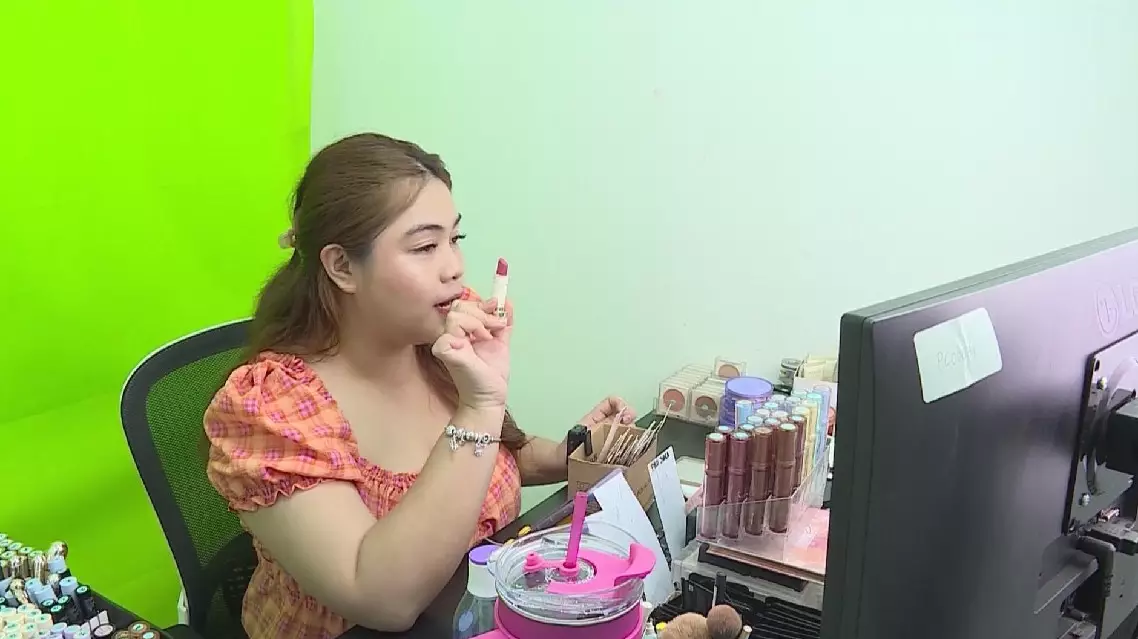Chinese beauty brands are finding success in Indonesia, bringing with them a wave of innovation and competitive pricing that is beginning to reshape the local beauty market.
As they leverage their homegrown success, companies like Focallure Beauty, based in south China's Guangzhou City, have successfully captured the hearts of Indonesian consumers with high-quality affordable products that make them competitive with the big global names that have long dominated Southeast Asian markets.
"Actually, from our founder himself, he emphasized a lot that when we are doing business in a country, we should adapt to the country, in this case, Indonesia. So it doesn't matter where our brands are from, China, anywhere else. If we're doing business in Indonesia, we are serving the customer in Indonesia. We focus on delivering a huge value to the customer. How do we do that? We get to know the culture. That's why maybe it's kind of different from other Chinese cosmetic brands," said Febryanto Febryanto, Vice General Manager for Focallure Indonesia.
Despite global economic challenges, Southeast Asia's Internet economy remains robust and is expected to grow to some 330 billion U.S. dollars by 2025.
Focallure takes advantage of Indonesia's burgeoning e-commerce ecosystem to boost its sales, with most of its products sold on short-form video platform Tik Tok, as well as Shopee, a major online shopping site.
Industry watchers say what makes Chinese brands so successful in Indonesia is how quickly they are able to adapt to local consumers. Most importantly, their products are high-quality with competitive prices.
"One of the main reasons why Chinese brands are so successful is because of the growth of e-commerce and social media in Indonesia. Many of these companies use social media as their main marketing strategy. We must admit that social behaviors are changing, more people are geared towards their phones rather than TVs. The beauty industry will continue to grow and become more dynamic alongside the e-commerce industry," said Salsabila Azkia Bila, a cosmetic industry researcher.
In large part, Chinese cosmetics bound for the Asia-Pacific region are shipped from Guangzhou ports. Customs in the city observed a hefty 75 percent boost in cosmetic exports through its ports after the implementation of a regional free trade agreement known as RCEP in 2022.

Chinese beauty brands winning over Indonesian consumers
Macao has been emerging as a global hub for conventions and exhibitions in recent years by exploring the enormous opportunities in the sector, driving the region to advance its economic diversification and embrace a brighter future.
Macao has received many awards this year, such as the Best Convention City (Asia) and the Best BT-MICE City, showcasing the recognition for and influence of Macao's exhibition industry.
More than 1,000 electronic game enthusiasts from all over the world gathered recently in Macao to participate in a esports themed event.
Su Zhili, organizer of the event, said that Macao's rich experience in hosting large-scale events, coupled with its good infrastructure, has driven him to choose the region as an ideal destination to hold such an activity.
"Macao has held many similar large-scale events. It has rich experience, and the facilities at the venue are relatively mature, so we can start our work comfortably," said Su.
During the first three quarters of 2024, Macao held more than 1,000 conferences and exhibitions in total.
"We will invite more professional, special conferences to be held in Macao and also cultivate more exhibition brands with international influence in Macao, so as to promote Macao's exhibitions to be more market-oriented, professional, international, digital and greener from various aspects. This is our goal," said Elaine Wong, member of the Macao Commerce and Investment Promotion Institute.
In addition, multiple large exhibitions and conferences, such as the Macao International Trade and Investment fair, the Macao Franchise Expo, and the International Infrastructure Investment and Construction Forum, are held regularly in Macao.
With the introduction of a series of policies and measures to facilitate the exchanges between the mainland and Macao, as well as the construction and development of the Guangdong-Hong Kong-Macao Greater Bay Area and the Guangdong-Macao In-Depth Cooperation Zone in Hengqin, Macao's convention and exhibition industry will embrace more opportunities for development in the foreseeable future.
"We have such a good industrial base in the Greater Bay Area. The mode of 'Convention and Exhibition + Industry' not only integrates the industries of Macao, but also the industries of the Greater Bay Area. In addition, Macao actively integrates into the national development and plays a role in the Belt and Road. Why are we so confident in Macao's convention and exhibition sector? Because it is backed by the motherland, and the country gives Macao great support," said Alan Ho, chairman of the Macao Association of Convention, Exhibition and Tourism Sectors.

Macao emerges as global hub for conventions and exhibitions, driving economic diversification and international recognition










